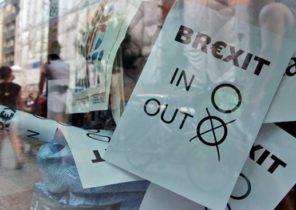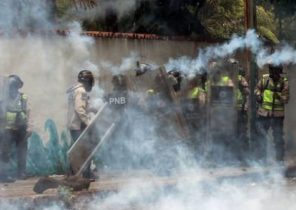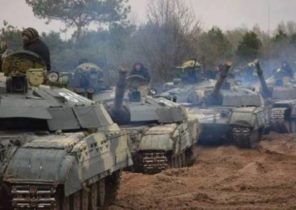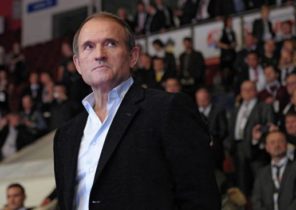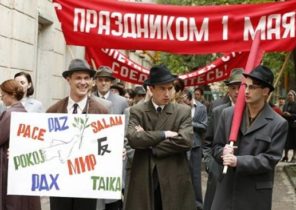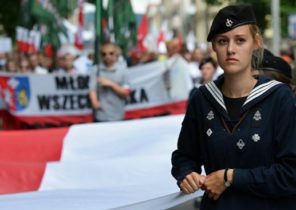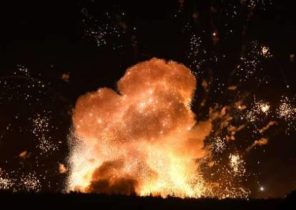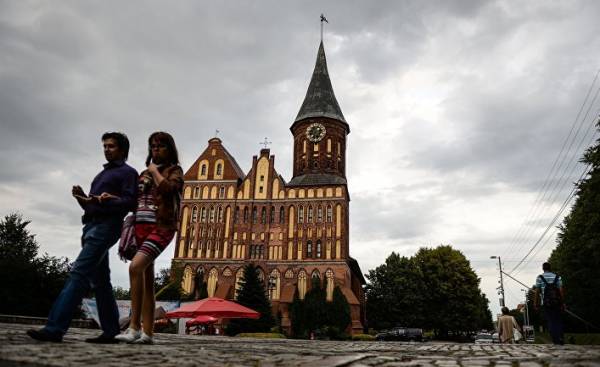
Those whom the gods destroy, they first deprive of reason. The final phase of the EU summit, which was held in Malta in February, the President of Lithuania Dalia Grybauskaite (Dalia Grybauskaite) has rejected the call by the Prime Minister Theresa may “constructively and patiently” to interact with the administration of trump: “I don’t think the bridge makes sense, said the Iron lady of Lithuania (she likes it when call her that), obviously deciding to make a joke. — We communicate with the Americans on Twitter”.
Pay attention to who said it and about whom. Lithuania is a Baltic state, the area of which is less than the area of Scotland, and a population smaller than Wales. Except for a brief period of time between the two world wars, this country for many centuries was ruled by its larger and more powerful neighbors, and only a quarter of a century ago it gained independence after the collapse of the Soviet Union. President Grybauskaite calls himself independent, but in reality it is not. During his career without any difficulty I got a new job in the Communist party of the Soviet Union to work in the Commission of the European Union. This transition, apparently led to the formation of such a worldview, an integral component of which is anti-Americanism. And, like the rest of the heads of EU States gathered in Malta, the Lithuanian “iron lady”, of course, has a particular dislike for Donald Trump.
Mr. trump was the only subject in which EU leaders failed to reach a full understanding. Even Breaksit could not unite the 27 member States (some citizens whom I envy the British) so firmly as did the election of the American President, which, according to many Eurocrats, even worse than Vladimir Putin. When European Commission President Jean-Claude Juncker (Jean-Claude Juncker) was asked which of these two is worse, he refused to answer this question. Dream of the cold war that the EU will become a third superpower between the USA and the USSR, already in the past. On the eve of the Malta summit President of the European Council Donald Tusk (Donald Tusk) noted that “given the fact that the new administration [trump], apparently, questioned the last 70 years of American foreign policy… the disintegration of the European Union will not lead to some mythical sovereignty of its members, and to their real and actual dependence on major powers: the US, Russia and China.” In other words, the EU can and should also become a superpower, if only its members will adhere to the line of Brussels. This idea lies at the heart of EU plans to create its own armed forces.
In the late XVI and early XVII century, Lithuania was also a contender for superpower status. The Polish-Lithuanian Commonwealth ruled a vast multinational Empire in Eastern Europe stretching from the Baltic to the Black sea. In the splendid Opera of Musorgsky “Boris Godunov”, which unfolded in that period of time, one of the leitmotifs was the threat to Russia from Lithuania. However, in the modern world Lithuania, like other Baltic countries, and Central and Eastern Europe — has the ability not to succumb to the gravitational pull of Russia in the East and Germany in the West only because the international order which was established by the League of Nations and then the UN, the guarantor of which ultimately make the United States.
The fundamental fact that the security and preserve the independence of the Europeans for a long time depended on the Americans, overshadowed by the miasma of panic, posturing and passive aggression that swept the continent since the election trump and especially his inauguration.
But I draw Your attention to Lithuania not only because it is a striking manifestation of these trends, but also because it so happened that adjacent to a very mysterious corner of Europe, the existence of which knows only a few Germans, poles and its Baltic neighbors. We are talking about the Kaliningrad region — a Russian enclave in the heart of NATO. It’s all forgotten place cut off from the rest of Europe and connected to Russia only by sea and by air, was a closed military base throughout the cold war period. Closed and forgotten Kaliningrad could not recover as a result of the boom of the 1990s, years that brought independence to Poland and the Baltic States. Millions of Russians still mired there, living in deep poverty, demonstrating low life expectancy and has nothing on hoping. Only now the place is gradually starting to revive, but this revival was not about its former architectural and intellectual achievements — not to mention its value to trade — and it is much more sinister functions that he performed during the Soviet era. It turned into a fortified military base from which Russia could threaten the West. Putin has turned into Kaliningrad oblast is the most militarized area of Europe, abounding in “Iskander”, “Bastions”, flying invisible warships and equipment to conduct surveillance. And from Berlin, this place is just 500 kilometers.
Before Stalin annexed and renamed the city in 1945, Kaliningrad was königsberg, the former capital of East Prussia. In 1256 he was first mentioned in historical documents: the castle, situated on the river Pregolya, which can be reached from the Baltic sea dominated over the following city over the next seven centuries. It was the residence of the head of the Teutonic order, later Brandenburger kurfursten, and then the Prussian kings. In the eighteenth century königsberg he gave the title the political and economic center of Berlin, but he continued to play an important role in the revival of Germany and Europe as a whole. The philosopher Emmanuel Kant who lived in Koenigsberg entire life, served as the magnet that was attracted to talented people, resulting in their role in the education of this city to compare with Edinburgh. The Baltic Athens became home to such romantics as Johann Gottfried herder and Johann Georg Hamann wrote, mage of irrationalism and the prophet of culture, Heinrich von Kleist, whose remarkable career has covered the gloomy landscapes of Eastern Prussia, his brilliant genius, Ernst Theodor Wilhelm Hoffmann, whose creepy tales still make readers grow cold from fear. In the 20th century political philosopher Hannah Arendt (Hannah Arendt) and the late chief Rabbi Immanuel Jacobovits (Immanuel Jakobovits) became one of the few members of the thriving Jewish community of königsberg, who managed to escape before the war.
Like many other fortresses and cities of this region, where to get stone for building it was quite difficult, Koenigsberg was built of brick, the Gothic forest of turrets and towers. In the XIX century there were industrial enterprises, and began an active trade. His policy began to tilt to the left — liberal hero of the 1848 revolution and pioneer of the emancipation of the Jews by Johann Jacobi (Johann Jacoby) to Otto Braun (Otto Braun), socialist, became Prime Minister of Prussia in the Weimar Republic, and resolute opponent of Hitler. However, behind the walls of a fortress built in the feudal era, he worked for numerous farmers of Germanic and Slavic origin, which ruled the rural aristocracy, who considered these lands, depending on the particular nature of its representative in any idyll or backwater.
Unlike other Eastern provinces of Germany, where they lived mainly by the Prussian reactionaries, the aristocracy of East Prussia was more cosmopolitan. One of the representatives of this caste was the Countess Marion denhoff (Marion Dönhoff). Being the editor and publisher of Die Zeit, she became the Grand Dame of German post-war liberalism. But she really wanted to East Prussia, where she grew up in a luxurious mansion Friedrichstein, is not forgotten.
In her memoirs, dedicated to the expulsion of Germans from East Prussia, which was published in 1962, there are numerous photographs of the ruined castles and houses, including photograph of Konigsberg, on fire after the RAID of the British bomber “Lancaster.” Her elegiac farewell to her favorite landscapes was addressed to her fierce countrymen, which took three decades to abandon their territorial claims. The fall of Konigsberg in April 1945, although its magnitude inferior to the scale of the fall of Berlin — was no less apocalyptic. Hans von Lehndorff (Hans von Lehndorff), one count of East Prussia, was able to go through it all — mostly due to the fact that the Russians appreciated his medical skills.
In his “Diary of East Prussia”, he described the transition from Nazism to a Communist regime in the period from 1945 to 1947. This book, published in 1967, became an immortal classic. With deep regret and a dry sense of humor Lehndorff talks about the horrors suffered by the former oppressors of the Russian soldiers, determined to take revenge. A few weeks later liberated civilians herded into the camp, he and his subordinates were sent back to Konigsberg, there to they were looking for the remains medicines. One of the colleagues of Lendorf made a remark to him about his worn clothes: “You can’t go to town in this hat!” He could not believe that anyone else not really care. “The city? This is a huge pile of rubble. And the people are tiny beetles dung beetles, which just went ice skating and still can’t understand how they managed to stay alive. It’s hard to believe there are still people who take this obvious divine verdict for a terrible accident.” In just two years all the remaining Germans expelled, replacing them with Russian settlers.
70 years after the horrific events in Koenigsberg is all forgotten place again can be a major source of conflict. Not only Germans but all of Europe threatens this divine punishment — not for the horrific crimes of the Nazis, and the complacency that has become almost criminal. Today Kaliningrad is very reminiscent of Mordor from Lord of the rings: the gloomy earth, over which towers the all-seeing Russian intelligence. There is an Arsenal of tactical nuclear weapons capable of destroying the North-Eastern Europe is the most likely theater of war after Ukraine. No system of defence of the Baltic States will not help, until the Russian bridgehead is located in the rear of NATO forces, far beyond the Eastern borders of the Western Alliance. Kaliningrad is a time bomb that can explode at any moment.
Europeans continue to ignore the threat posed by an expansionist Russia, which considers all of the former Soviet Union part of its legitimate sphere of influence. But Europe also is turning its back on America, which today really is the last hope of Western civilization. As I wrote, the military of the US and NATO are still in the Baltic States to deter the threat from Kaliningrad. But what if President trump decides to respond to the demonstrative opposition from its European allies the withdrawal of these troops? Why would America risk a nuclear war for Lithuania and all other members of NATO? If the British public agree with the speaker of the house of Commons John berkou (John Bercow) that this President is unworthy to appeal to Parliament, why do we consider it permissible to seek support to American troops that he commands? If we behave with Mr. trump like he’s a leper, he is seriously mistaken, criticizing Europe for the fact that she makes herself helpless and allows terrorists and immigrants to overwhelm her city? Kaliningrad is a symbol of historical memory: the loss of collective memory, history, language and culture as a result of the ambitions of the conquerors.
The truth is that peace in Europe to a certain extent depends on the Kaliningrad factor: a distant, but real possibility that war could break out within or in the vicinity of this Russian enclave. The territorial integrity of Ukraine was guaranteed by the signatories to the Budapest Memorandum in 1994, in particular the United States, Britain and Russia in exchange for Ukraine giving up its nuclear Arsenal. 20 years later nothing has not prevented Russia to Annex Crimea and invade Ukraine. If the President is of the opinion that the UK does not need her as a transatlantic bridge because “we communicate with the United States Twitter,” God help the Baltic States if and when the Kaliningrad factor works.
